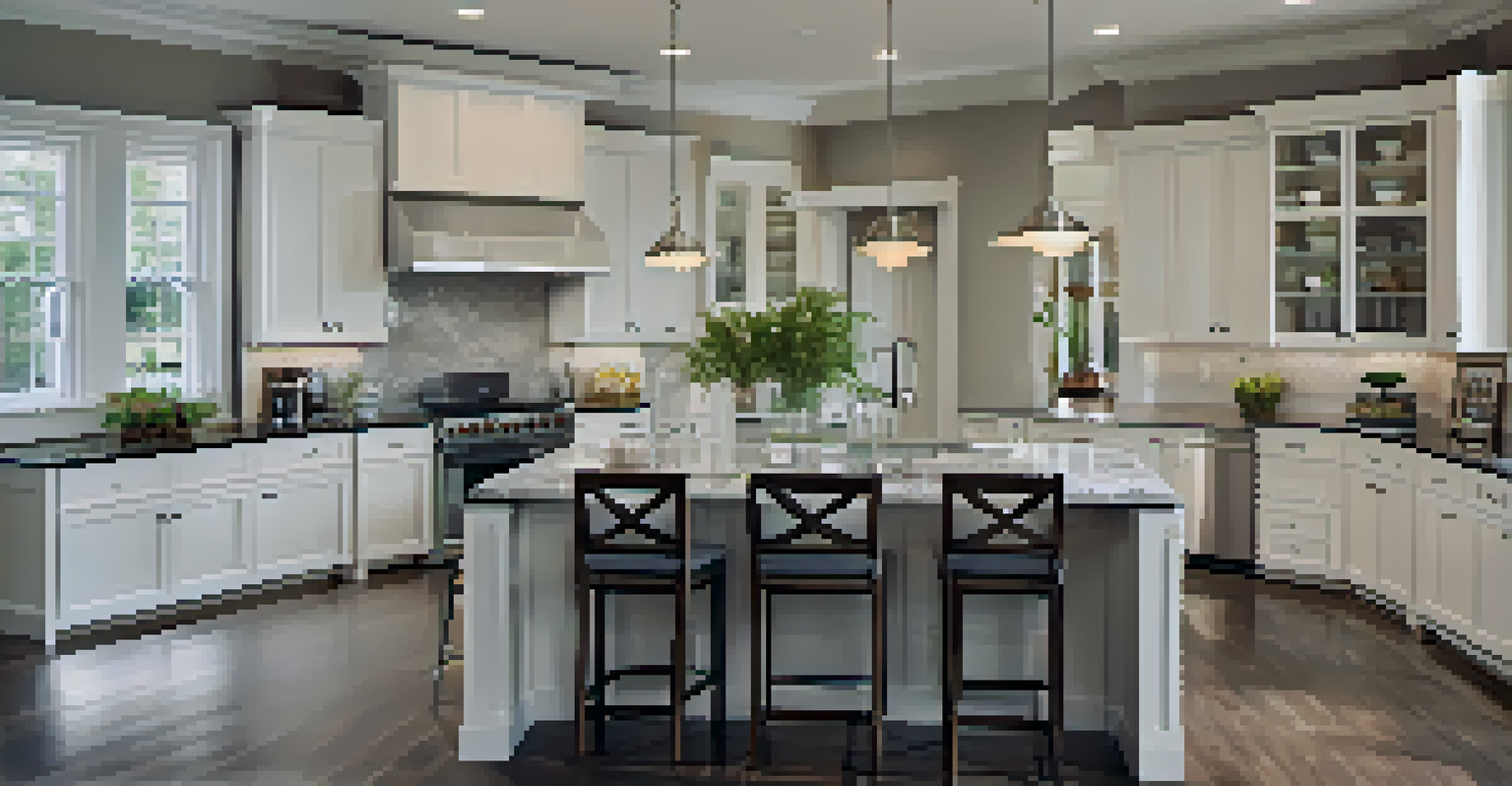How to Assess Your Home’s Value Before Renovating

Understanding Home Value: What It Really Means
Home value isn't just a number; it's a reflection of your property's worth in the current market. Factors like location, size, and condition all play crucial roles in determining this value. Understanding these elements can help you make informed decisions about your renovation plans.
Value is not what you get. It's what you give.
A home’s value can fluctuate based on economic conditions and buyer demand. For instance, a booming job market may increase home values in a specific area, while an economic downturn can have the opposite effect. This variability underscores the importance of timing when considering renovations.
Ultimately, knowing your home's value helps set realistic expectations for your renovation budget and potential return on investment. If you know your home's baseline worth, you’ll be better equipped to assess how renovations could enhance its value.
Researching Market Trends in Your Neighborhood
To assess your home’s value accurately, start by researching market trends specific to your neighborhood. Look at recent sales of similar properties, often referred to as 'comps'. These comparisons can provide valuable insights into what buyers are willing to pay in your area.

Online real estate platforms can be a goldmine for this information. Websites like Zillow or Realtor.com offer data on home sales and market trends, which can help you identify patterns in pricing. Additionally, local real estate agents can provide expert knowledge on your neighborhood’s dynamics.
Understand Home Value Basics
Home value is influenced by factors like location and condition, impacting renovation decisions.
Understanding these trends not only helps you gauge your home's current value but also informs you of the potential impact of your planned renovations. For example, if high-end finishes are trending in your area, investing in them might yield a better return.
Getting a Professional Appraisal: Is It Worth It?
One of the most reliable ways to assess your home’s value is through a professional appraisal. An appraiser uses various metrics, including the condition of your home and comparable sales, to provide an objective valuation. This can be especially helpful if your home has unique features that might not be captured in standard assessments.
The best investment on Earth is earth.
While there’s a cost associated with hiring an appraiser, the insights gained can significantly influence your renovation decisions. If the appraisal suggests a higher value, it may justify spending more on renovations. Conversely, a lower appraisal could encourage you to rethink your investment plans.
In short, a professional appraisal can serve as a solid foundation for your renovation strategy, helping you ensure that your money is well spent and aligned with your home's true market value.
Evaluating Your Home’s Condition and Needs
Before diving into renovations, take a close look at your home's current condition. Identify any structural issues, outdated systems, or areas needing repair. This evaluation not only helps prioritize your renovation efforts but also plays a crucial role in determining your home's value.
For example, if your roof is nearing the end of its lifespan, it might be wise to address that before investing in aesthetic upgrades. Buyers typically look for homes that won’t require immediate repairs, so fixing these issues can significantly enhance your home’s appeal.
Research Local Market Trends
Analyzing recent sales and comps in your neighborhood helps gauge your home's value and renovation potential.
By understanding and addressing your home's needs, you can ensure that renovations are both practical and value-adding, setting you up for success when it comes time to sell.
Calculating the Cost of Your Renovation Plans
Next, you’ll want to calculate the costs associated with your renovation plans. This includes everything from materials and labor to any permits or inspections that might be necessary. Knowing these costs upfront can help you avoid overspending and keep your budget in check.
A well-planned renovation budget can also highlight which projects will provide the best return on investment. For example, kitchen and bathroom remodels tend to yield higher returns compared to other improvements. By focusing on these areas, you can maximize the value added to your home.
Additionally, consider setting aside a contingency fund for unexpected expenses. Renovations often uncover hidden issues that can lead to additional costs, and being prepared for these surprises can help keep your project on track.
Assessing the Return on Investment for Renovations
When planning renovations, it’s crucial to consider the potential return on investment (ROI). Some projects may significantly increase your home’s value, while others may not provide the same benefits. Calculating ROI helps you prioritize renovations that will yield the best financial return.
For instance, adding energy-efficient windows might not only improve your home's aesthetic but could also lower energy bills, making your home more appealing to buyers. On the other hand, luxury upgrades might not recoup their costs in a less competitive market.
Focus on ROI for Renovations
Prioritizing renovations with higher returns on investment ensures your efforts enhance your home's value.
By focusing on renovations with higher ROI, you can ensure your efforts contribute positively to your home’s value, making your investment worthwhile.
Getting Feedback from Real Estate Professionals
Consulting with real estate professionals can provide valuable insights into your home’s value and renovation potential. Agents who understand your local market can offer advice on which renovations are most attractive to buyers in your area. They can also help you set realistic expectations based on current trends.
Consider asking for a comparative market analysis (CMA), which can show how your home stacks up against similar properties. This analysis can highlight areas for improvement and help shape your renovation strategy.

Feedback from professionals can ensure you’re making informed choices that align with market demands. This collaboration can ultimately enhance both your renovation experience and the value of your home.